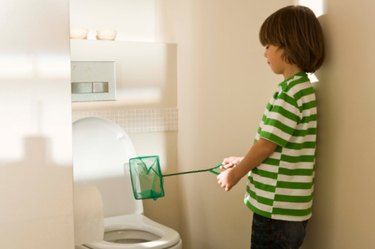Things You'll Need
Marker
Measuring tape
Straightedge
Hacksaw
File
Silicone caulk
Caulk gun
Damp rag
Adjustable wrench
Braided water supply line

Wall-mount toilets, commonly used in Europe, use less floor space than traditional floor-mounted toilets. The wall-mounted toilet is installed to a 2-bolt or 4-bolt support closet carrier system inside the wall cavity, as this supports the toilet and provides the drain for the unit. American Standard recommends that fixture studs project 2-1/8 inches from the finished wall surface. Check your toilet manufacturer instructions for specific included parts and precise requirements before proceeding.
Step 1
Place the backup nuts from the wall-mount toilet kit onto the two lower closet carrier bolts and the bolt on the top left-hand side. Screw the nuts in until the face of the nuts are flush with the surface of the finished wall.
Video of the Day
Step 2
Place the rubber neoprene gasket on the closet outlet waste fitting pipe. This gasket provides an airtight and watertight seal in the same way a wax ring provides a seal for a floor-mounted toilet.
Step 3
Place the ribbed rubber gasket on the plastic inlet pipe.
Step 4
Open the packet of lubricant from the kit and lightly smear the lubricant onto the closet carrier inlet pipe and the closet carrier drain discharge pipe.
Step 5
Insert the closet outlet waste fitting pipe into the closet carrier inlet pipe as far as it will go. Insert the plastic inlet pipe into the closet carrier inlet pipe as far as it will go. Mark a line on the pipes with a marker where the pipes meet the wall.
Step 6
Turn the toilet on its side. Smear the lubricant into the inner diameter of the holes to the water inlet and waste fitting areas. Remove the closet outlet waste fitting pipe and the closet carrier inlet pipe from the pipes in the wall. Insert the pipes into the lubricated holes of the toilet. Press firmly to ensure a very tight fit.
Step 7
Take the straightedge and lay it across the bottom of the toilet, up against the two pipes you just inserted. Mark a line with the marker where the outside of the toilet meets the pipes. The pipes now have two marker lines on them.
Step 8
Measure the distance between the two marker lines on the waste fitting pipe. Measure up from the end of the fitting pipe and add 1/8-inch to the measurement. Mark a line on the pipe with the new measurement. Repeat the process for the inlet pipe.
Step 9
Remove the pipes from the toilet. Use the hacksaw to saw at the new marker lines. File the ends of the pipes to remove burrs. Insert the newly cut pipes into the wall closet carrier holes. Press firmly.
Step 10
Screw the bolts from the closet carrier system into the wall, allowing the bolts to protrude approximately 2-1/8 inches from the finished wall surface. If your toilet manufacturer specifies a different measurement, follow the manufacturer directions.
Step 11
Apply silicone caulking to the flat edges on back of the toilet. Hoist the toilet and mount it to the wall, taking care to line up the bolt holes with the wall support bolts and align the waste and inlet holes of the toilet with the waste and inlet holes on the wall. Press firmly.
Step 12
Insert the washers onto the bolts that are projecting through the toilet flanges. If your manufacturer provides leveling or felt washers, install them onto the bolts now. Insert the nuts onto each bolt and tighten them with a wrench 1/4-inch of a turn. Do not over-tighten the nuts or you may crack the porcelain.
Step 13
Apply silicone caulk between the bowl and the finished wall. Remove excess caulk with a damp rag.
Step 14
Lay the large rubber gasket into the threaded hole on the bottom of the tank if your toilet comes with a separate tank. Lift the tank and carefully place the tank onto the back of the toilet bowl. Align the tank's bolts and the rubber gasket to slip evenly into the holes of the toilet bowl.
Step 15
Insert the washer and the nut from the kit onto one of the tank's bolts from the underside of the toilet bowl. Tighten the nut by hand. Repeat for the other side. Tighten both nuts 1/4 of a turn for a snug fit. Do not over-tighten the nuts.
Step 16
Connect one end of the braided water supply line to the water supply inlet under the tank. Tighten the coupling nut by hand. Connect the other end of the braided water supply line to the water supply valve that projects from the wall or floor. Tighten the valve nut by hand. Use a wrench to tighten both nuts 1/4 of a turn.
Step 17
Turn on the water supply and check for leaks. Tighten or replace fittings if necessary.
Tip
Enlist the aid of a helper. The toilet is heavy and you will need assistance attaching the cumbersome unit to the wall.
Warning
For proper operation, American Standard recommends that you provide a water supply line with a minimum of 20 pounds per square inch (psi). A professional plumber can measure your water pressure with a tool, or contact your local codes department or water authority department for information on your water supply system.
Never over-tighten nuts to bolts on the toilet or you may crack the porcelain.
Video of the Day